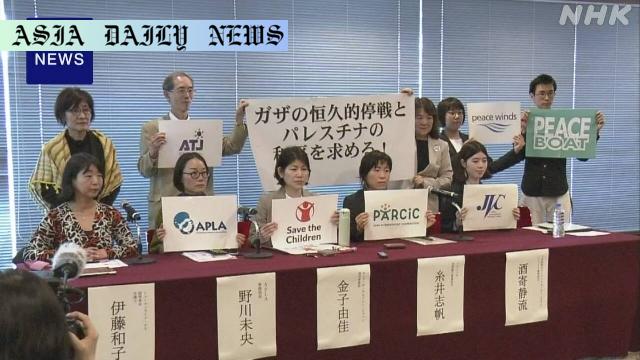Ceasefire: Japanese humanitarian groups stress the importance of a permanent ceasefire in Gaza amid ongoing devastation.
Japanese humanitarian groups urge for a permanent ceasefire in Gaza.
Over 270 children have died as large-scale attacks resume.
Gaza’s dairy and farming operations face severe disruption.
Attention also directed towards violence against children in the West Bank.

Ongoing Humanitarian Crisis in Gaza
Amid escalating violence in the Gaza Strip, eight Japanese humanitarian aid organizations have come forward to advocate for a permanent ceasefire. These organizations, which are deeply involved in providing critical support to the region, highlighted the devastating impact of ongoing conflict at a recent news conference held in Tokyo. Itoi Shiho from PARCIC, a group supporting livestock and dairy farming, shared harrowing updates about the destruction caused by the violence, including the closure of a dairy processing factory in southern Gaza. Efforts to continue operations in temporary settings have proven grueling, while the Israeli forces’ blockade of aid entry has further crippled the humanitarian response.
Children Pay the Heaviest Price
One of the most tragic aspects of the ongoing conflict is the toll it has taken on children. Kaneko Yuka of Save the Children Japan revealed that over 270 children had died in just one week after the Israeli military resumed intense attacks on March 18. She painted a picture of families briefly enjoying moments of peace during the ceasefire, only to be cruelly dragged back into fear and devastation as attacks resumed. This return to violence has not only shattered lives but has also left aid group workers emotionally drained and disheartened over the challenges they face in continuing their mission.
Broader Impact and the West Bank’s Plight
While much of the attention has been on Gaza, the Japanese humanitarian groups also flagged the worsening situation in the West Bank. Cases of detained children and violent acts by settlers are on the rise, further amplifying the need for global scrutiny and intervention. These incidents reflect a broader trend of violence and instability that extends beyond Gaza, underscoring the urgency for a comprehensive and lasting resolution to the conflict.
The Call for Global Attention and Action
The groups have collectively called on international communities to place heightened focus on the suffering in both Gaza and the West Bank. Beyond providing immediate relief, they stressed the importance of ensuring permanent halts to all forms of violence to enable long-term recovery and development. The humanitarian voices insist that sustained global pressure and action are the only paths to securing a future where families and communities in Gaza can live without fear. With more lives lost each day, the urgency to act grows ever more critical.
Commentary
The Tragedy of Recurring Violence in Gaza
It is profoundly disheartening to witness the recurring cycles of violence in regions like Gaza, where innocent civilians bear the brunt of geopolitical struggles. The latest updates from Japanese aid groups underline a simple yet powerful truth: no community or family should have to endure such relentless destruction. The loss of over 270 children in a single week is not just a statistic—it is a devastating reminder of the human cost of prolonged conflict.
Humanitarian Efforts Face Immense Challenges
The dedication of organizations like PARCIC and Save the Children Japan deserves both recognition and support. These groups are working under near-impossible conditions, striving to bring hope and sustenance to those trapped in turmoil. However, their efforts are being obstructed by systemic barriers such as aid blockades, which not only hinder immediate relief but also undermine the possibility of long-term strategy implementation. This underscores the critical need for a unified international push to ensure the uninterrupted flow of aid to conflict zones.
A Call for Sustained Global Solidarity
The call for a permanent ceasefire is not just a plea for peace but a demand for justice and humanity. It is crucial that governments, international organizations, and civil societies rally together, placing pressure on those in positions of power to prioritize peace negotiations. Moreover, the world must also amplify its focus on the West Bank, where rising violence adds further evidence to an already bleak picture of injustice. By showing solidarity and amplifying the voices of those in need, we can help pave the way for lasting change in a region that has endured far too much suffering.


